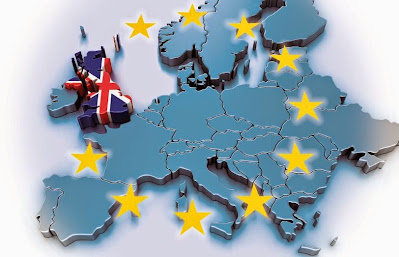Well, that was pretty clear cut. Not only did the British Conservative Party get re-elected, but it did so in rather impressive fashion, securing an overall majority in the House of Commons. There's no need for a messy coalition with those annoying Liberal Democrats, something the Tories had to endure for the last term.
No, this time the party led by David Cameron can govern as it sees fit – well, as much as it can inside the realms of a constitutional monarchy and a parliamentary system of governance.
 |
| The UK: Breaking the EU circle? (Image from eucentre.sg/.) |
You can't argue too much against the mandate that Cameron and co have received (unless you're from Scotland, where the Scottish National Party secured 56 of the 59 seats up for grabs there).
In one sense, you could argue, the result changes little. The Conservatives are back in, just this time with a little more force. Yet, what's to come could have much greater significance, especially in terms of the UK's political and trade relations with its European neighbours.
This is because of the referendum that will be put – unless the Tories do a dramatic, unexpected U-turn – to its electorate over the country's future in the European Union.
In one sense, you could argue, the result changes little. The Conservatives are back in, just this time with a little more force. Yet, what's to come could have much greater significance, especially in terms of the UK's political and trade relations with its European neighbours.
This is because of the referendum that will be put – unless the Tories do a dramatic, unexpected U-turn – to its electorate over the country's future in the European Union.
And if Cameron sticks to his word, the question will be straightforward, along the lines of: 'Should the UK remain part of the EU; yes or no?' The implications of a 'no' win, however, may not be so straightforward.
Of course, that Britain has been more of a Europhobe than Europhile since joining what was then the European Economic Community in 1973 won't come as a surprise to most.
Of course, that Britain has been more of a Europhobe than Europhile since joining what was then the European Economic Community in 1973 won't come as a surprise to most.
The legacy of having one of the greatest empires the world has ever seen doesn't go away quickly or quietly. Compromising with former enemies such as France and Germany has never gone down well with the British psyche.
Its decision not to join the euro, while not unique among EU-member states, served to further the belief on the European mainland that the UK was and is just paying lip service to the idea of greater integration of the 'Old Continent'. (That staying out of the European Monetary Union was probably a wise move considering the current state of play is something we won't fully go into right now.)
So with the traditionally Euroscpetic Conservatives in power, the wind in the party's sails thanks to securing an overall majority and with the much-talked-about referendum upcoming, that the UK may finally cut its official ties with Brussels seems almost inevitable.
This could be the opportunity to make 'Great Britain greater', as David Cameron vowed in his victory speech. In any case, a clear decision about British EU membership, one way or the other, could be just what both sides need.
A strong 'no' win and the UK can leave behind what at times has been a turbulent political union with its European counterparts and go about creating new alliances and arrangements.
Its decision not to join the euro, while not unique among EU-member states, served to further the belief on the European mainland that the UK was and is just paying lip service to the idea of greater integration of the 'Old Continent'. (That staying out of the European Monetary Union was probably a wise move considering the current state of play is something we won't fully go into right now.)
So with the traditionally Euroscpetic Conservatives in power, the wind in the party's sails thanks to securing an overall majority and with the much-talked-about referendum upcoming, that the UK may finally cut its official ties with Brussels seems almost inevitable.
This could be the opportunity to make 'Great Britain greater', as David Cameron vowed in his victory speech. In any case, a clear decision about British EU membership, one way or the other, could be just what both sides need.
 |
| Cameron cool: Is this the man to lead the UK out of Europe? (Photo from FB.) |
Sure, things could be awkward for a while as the country re-finds its feet, but it need not be disastrous. Britain only needs to take a glance north to Norway for a template on how a life outside the EU works.
In the backdrop to all this is next year's 100th-anniversary commemoration of the bloodiest confrontation of World War One, the Battle of the Somme. And while Britain emerged victorious from that war, in many ways it marked the beginning of the end of the Empire, as new forces to the east and west began to crank up their vast influence and power.
Is Britain now, however, set to emerge from what could be described as, to borrow from a book title of Colombia's late, great writer Gabriel García Márquez, its own '100 Years of Solitude'?
That might be overstating things, but at the very least the lead-up to the referendum and the fallout from it, whichever way it goes, should cause a bit of giddy excitement in Europe and beyond.
No comments:
Post a Comment